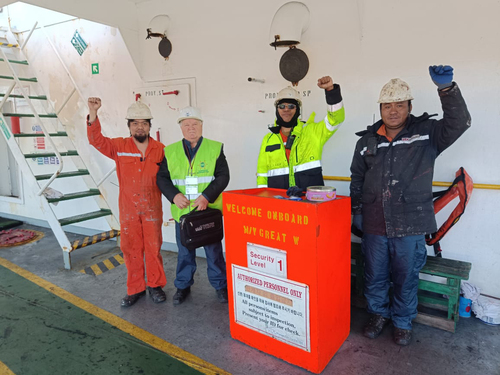ÐÎÑÑÈÉÑÊÈÉ ÏÐÎÔÅÑÑÈÎÍÀËÜÍÛÉ ÑÎÞÇ ÌÎÐßÊÎÂ
SEAFARERS' UNION OF RUSSIA
A NON-UNIONIZED SEAFARER
IS AN UNPROTECTED SEAFARER
Back
FETO SUR sent a notice to Estonian shipowner

Labor Inspectors of the Far Eastern Territorial Organization of the Seafarers’ Union of Russia visited bulk carrier Great W (Liberian flag, IMO 9326298), berthed at the coal terminal of Vostochny Port under loading of coal destined to the ports of South Korea. The visit was as part of the Concentrated Inspection Campaign of the Tokyo and Paris Memorandums of Understanding on Port State Control, which is focused on the working and living conditions of crew members. If finding serious violations during inspections, Port State Control Officers can detain a vessel until the deficiencies are addressed. All these actions are aimed at protecting the interests of the maritime workers.
The Great W crew consists of 22 seafarers: 11 Russians and 11 Burmese. The Russian seafarers were recruited through Sevastopol and Novorossiysk crewing agencies. According to Chairman of the Far Eastern Territorial Organization of the Seafarers’ Union of Russia Nikolay Sukhanov, there is no collective agreement with the trade union on board. The salary of an AB Seaman from Burma is $1,570, and that of a Russian captain is $10,200. All seafarers have individual contracts, which specify the amount of salary and the next of kin entitled to receive insurance payout in the event of the death of a crew member. Each seafarer's employment contract has an Appendix with the terms of employment, specifically the amount of insurance payouts of $108,000 for death during the period of work under the contract and $21,000 for each minor child of the seafarer (under 18 years old). Daily food rations are $10 per crew member. There are no wage debts.
When the seafarers free from watch and work gathered together, the FETO SUR representatives explained to them that the Liberian flag, which the Estonian shipowner chose to register the vessel, was a flag of convenience. Seafarers' unions around the world are convinced that there must be a genuine connection between the owner of the vessel and the flag under which the vessel operates, in accordance with the UN Convention on the Law of the Sea. There is no such connection, the vessel is registered in a cheap register. The reasons for using flags of convenience by shipowners are low registration fees and taxes or their absence at all, the opportunity to hire cheap labor. "Once a shipowner registers the vessel under a flag of convenience, an employer can save on wages and cut costs by lowering the standard of living and working conditions of crews," - Sukhanov explains.
The labor inspectors of the Far Eastern Territorial Organization of the Seafarers Union of Russia made it clear to the crew that, in the event of labor disputes, there are no guarantees that the owner of the vessel will uphold his obligations. The only thing that guarantees it is a collective agreement with trade unions.
At the request of the seafarers, it was decided to send a notice to Klip Marine Ship Management Ltd (Estonia) with a proposal to conclude a collective agreement with the Estonian Seafarers' Union. In addition, the SUR representatives gave the crew of bulk carrier Great W books on the rights of seafarers working on FOC vessels and fresh magazines "Maritime Unions Herald".
The Russian and Burmese seafarers thanked the representatives of the Seafarers' Union of Russia for the information provided.
Photo: FETO SUR
Up
